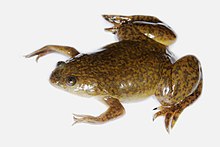Xenopus laevis
| African clawed frog | |
|---|---|
 |
|
| Scientific classification | |
| Kingdom: | Animalia |
| Phylum: | Chordata |
| Class: | Amphibia |
| Order: | Anura |
| Family: | Pipidae |
| Genus: | Xenopus |
| Species: | X. laevis |
| Binomial name | |
|
Xenopus laevis Daudin, 1802 |
|
The African clawed frog (Xenopus laevis, also known as the xenopus, African clawed toad, African claw-toed frog or the platanna) is a species of African aquatic frog of the Pipidae family. Its name is derived from the three short claws on each hind foot, which it uses to tear apart its food. The word Xenopus means "strange foot" and laevis means "smooth".
The species is found throughout much of Sub-Saharan Africa (Nigeria and Sudan to South Africa), and in isolated, introduced populations in North America, South America, and Europe. All species of the Pipidae family are tongueless, toothless and completely aquatic. They use their hands to shove food in their mouths and down their throats and a hyobranchial pump to draw or suck things in their mouth. Pipidae have powerful legs for swimming and lunging after food. They also use the claws on their feet to tear pieces of large food. They lack true ears, but have lateral lines running down the length of the body and underside, which is how they can sense movements and vibrations in the water. They use their sensitive fingers, sense of smell, and lateral line system to find food. Pipidae are scavengers and will eat almost anything living, dying, or dead and any type of organic waste.
These frogs are plentiful in ponds and rivers within the south-eastern portion of Sub-Saharan Africa. They are aquatic and are often greenish-grey in color. Albino varieties are commonly sold as pets. "Wild type" African clawed frogs are also frequently sold as pets, and often incorrectly labeled as a Congo frog or African dwarf frog because of similar colorings. They are easily distinguished from African dwarf frogs because African clawed frogs have webbing only on their hind feet while African dwarf frogs have webbing on all four feet.
They reproduce by fertilizing eggs outside of the female's body (see frog reproduction). Of the seven amplexus modes (positions in which frogs mate), these frogs are found breeding in inguinal amplexus, where the male clasps the female in front of the female's back legs and squeezes until eggs come out. The eggs are then fertilized.
...
Wikipedia

